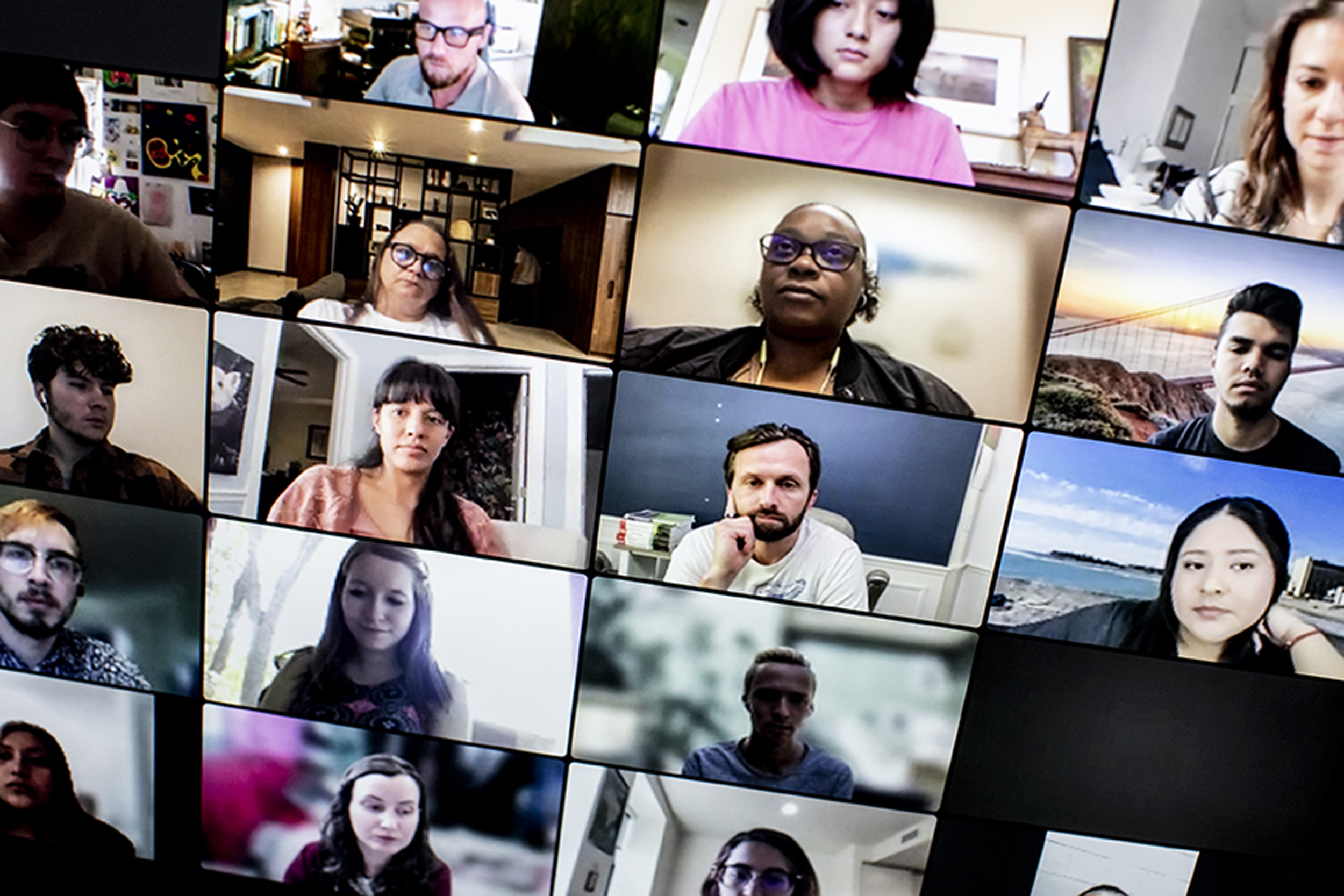
Illustration by Judy Blomquist/Harvard Staff
Learning how to talk about divisive issues
Edmond J. Safra Center teaches ways to facilitate fraught conversations
Amado Candelario is a former debater who doesn’t shy away from conflict. But after seeing polarization in American politics increase, especially on social media, he looked for a different approach for talking with people who held different views on divisive issues such as immigration, gun control, and free speech.
The sophomore found that space in the Intercollegiate Civil Disagreement Partnership (ICDP) program at the Edmond J. Safra Center for Ethics. The yearlong fellowship teaches undergraduates at Harvard and four other colleges and universities across the country how to facilitate conversations on contentious issues and build connections across political divisions. The organization will host Civil Disagreement: Public Safety & Policing in America, a virtual panel discussion with speakers from a range of perspectives on the issue, on Thursday at 4 p.m.
“I am very passionate about social issues and a left-leaning perspective on topics, and I wanted to see the insight that other people could provide” from different political ideologies and backgrounds, said Candelario, a joint concentrator in computer science and government from Chicago. “There’s a time for debating and a time for having a conversation, and I’m trying to learn skills in order to have healthy dialogue with people who think differently from me.”

The Intercollegiate Civil Disagreement Partnership program will host Civil Disagreement: Public Safety & Policing in America on Thursday at 4 p.m.
Rose Lincoln/Harvard Staff Photographer
Candelario is one of eight Harvard students who participated in this year’s cohort, along with eight students from each partner school — Stanford; California State University at Bakersfield; Santa Fe, a community college in Gainesville, Florida; and St. Philips, a historically Black college in San Antonio, Texas.
A key objective of the program is to teach students the skills to manage a charged discussion with openness and confidence, said Jacob Fay, ICDP co-creator and a postdoctoral fellow at the Edmond J. Safra Center for Ethics.
“We are a program that doesn’t seek out to win arguments, but tries to help people see each other in greater degrees of complexity,” said Fay. “We show the students the power of asking questions rather than responding with declarations and statements, and it’s such a powerful move to switch their orientation away from persuading someone about an idea to just trying to understand it.”
Each week, the full group from Harvard and its partner schools meet online for a short lecture, small group facilitation sessions led by students, or some combination of the two. Some students who completed the program last year, called senior fellows, are on hand to observe and offer real-time feedback on the students’ work. Topics included the state of American democracy, gun rights, and the extent of free-speech rights.
At a recent meeting on the theme of education, Candelario and Victoria Wilson ’25 led a small group discussion about how questions of identity should be taught in elementary schools. Other breakout sessions focused on mental health needs in schools and banning books in school libraries.
The two used a facilitation tool called Courageous Conversation Compass as a framework. The method helps students recognize the emotional, moral, relational, and intellectual elements of what they or others say or do. The group shared personal recollections of learning about race and gender in schools and discussed possible changes to school curricula based on those experiences.
Wilson said tools like the Compass were helpful when it came time to discuss thorny societal issues. She also recalled another exercise where students did short presentations about themselves to the group about their values and background. She included a Greek flag to represent her family’s heritage and a cross to represent her Christian faith.
“There are students here from public schools and private schools, veterans, married people, and 18-year-olds like me, so there’s a variety of opinion. It could be really contentious, but we are all here for the same reason,” said Wilson, who is from Scarsdale, New York. “I know we can’t always mirror these conversations in society, but I’m learning how to keep the flow of a conversation going and make it productive.”
“Disagreement should not and is not going to be polite all the time, especially when you’re talking about something that directly implicates important pieces of who you are,” said Fay. “What we talk about is learning to facilitate and encourage disagreement within the bounds of a set of norms and agreements. That means it will be somewhat more expansive than people expect.”
Narges Obaid, a junior at Cal State, Bakersfield, studying political science and psychology, looked forward to using her new skills in academic and personal settings.
“Those facilitation skills can be used in formal settings but also in family settings, where you can make sure that people hear each other out,” said Obaid. “I’ve really gained the courage to just be out there and be comfortable” speaking to others about controversial topics.
Santa Fe’s Prince Ulame Erase saw a connection between his experience in ICDP and his future plans to work in communications.
“Now, if I’m thinking about public speaking, I should be able to see things from a very diverse point of view, not just looking at it from my point of view alone,” said Erase, who studies organizational management and started a campus Justice Club in 2019. “I think it’s also very rewarding for an audience because you can show them that you understand where they’re coming from.”
Candelario noted that the ICDP training was helping him navigate political differences in a more personal way.
“For me, when having a conversation with an individual it’s much easier to accept differing perspectives,” added Candelario. “Meeting people from so many different schools has cemented that in the way that I go about operating with people, knowing that compassion and kindness are necessary. You have to keep having conversations if you want to see change actualized.”




